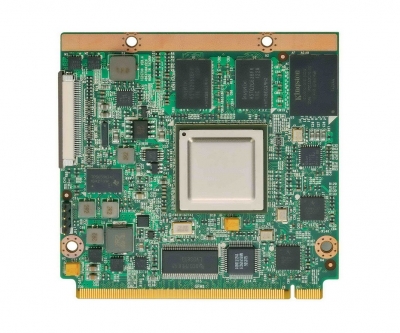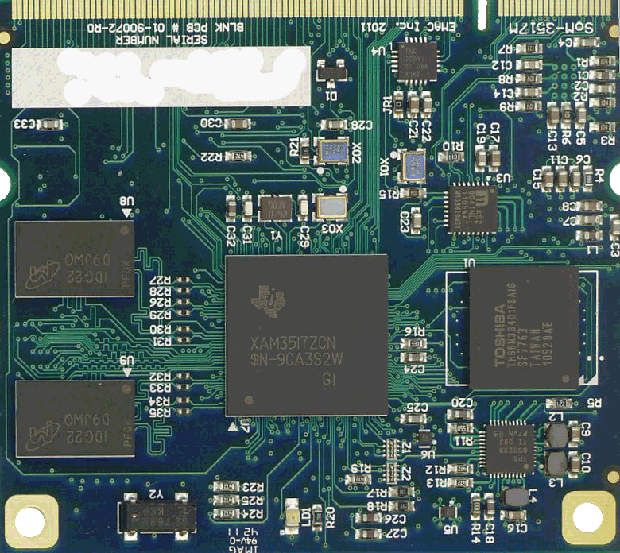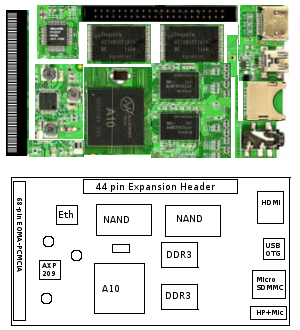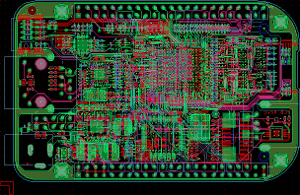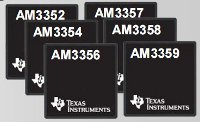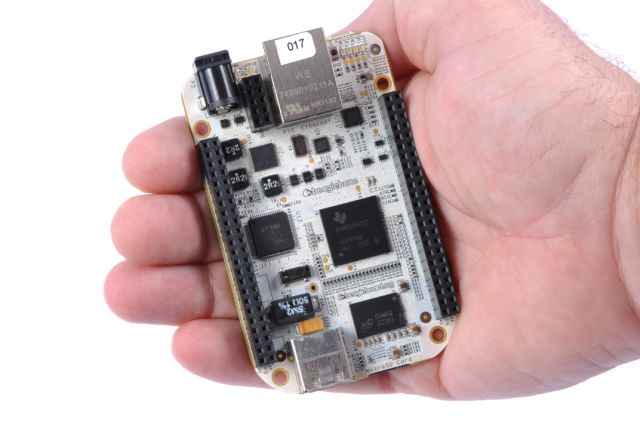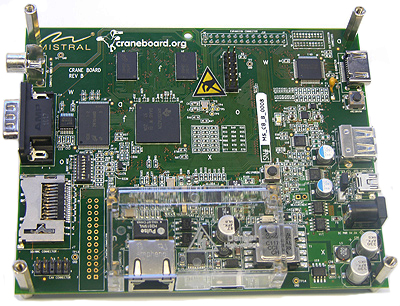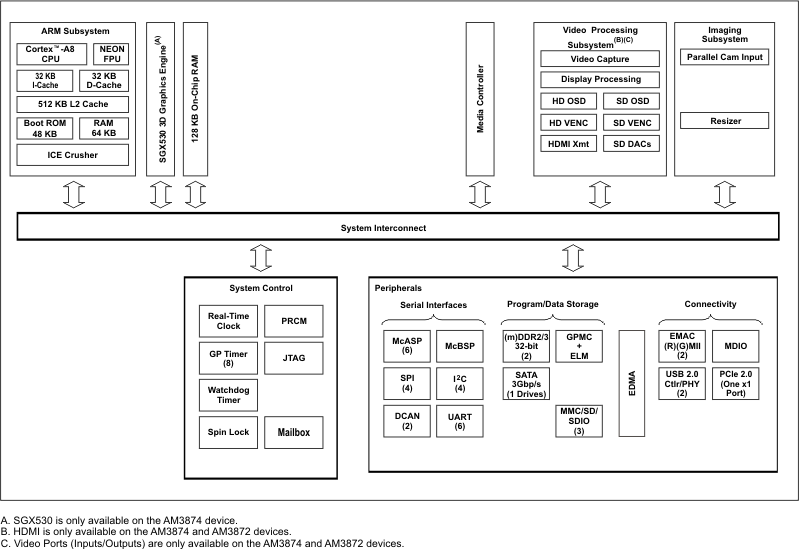GreenBase Technology has unveiled the GQ-3874 and GQ-8148 Qseven modules based on Texas Instruments Cortex A8 processors. The GQ-3874/8148 features a PCI-e slot, SATA, four USB, four UART, dual CAN bus, ARM Cortex A8 1GHz processor, and SGX530 3D graphics engine. The GQ-3874 – Qseven Module uses the following CPU and GPU: CPU – Texas Instruments Sitara AM3874 1GHz ARM Cortex-A8 MPU GPU – SGX530 3D Graphics Engine and the GQ-8148 – Qseven Module uses the following CPU, GPU, DSP and Video hardware accelerator: CPU – Texas Instruments DaVinci DM8148 1GHz ARM Cortex-A8 MPU GPU – SGX530 3D Graphics Engine DSP – Integra C674 750MHz DSP HDVICP2 Video Encoder/Decoder hardware accelerator Both boards share the following specifications: Memory & Storage Onboard DDR3 Memory 512MB/1GB Onboard eMMC Flash 4GB/8GB Qseven 230 pin Edge Connector with: 2 x GbE 1 x PCIe 1 x SATA 1 x HDMI 4 x USB 2.0 […]
EMAC SOM-3517M: System-on-Module based on TI AM3517
Emac announced the SoM-3517M, a System-on-Module (SoM) based on TI AM3517 Cortex-A8 processor clocked at 600 MHz. This SOM has an Ethernet PHY included along with 4 serial ports. It supports up to 512MB of external DDR2 SDRAM, 1GB of NAND Flash, 2GB of eMMC Flash. Here are SOM-3517M specifications: CPU: TI ARM Cortex-A8 600 MHZ Fanless processor System Memory: Up to 512 MB of DDR2 SDRAM (default: 256 MB) Storage: Up to 1 GB of NAND Flash (default: 256 MB) UP to 4 GB of eMMC Flash (default: 2 GB) LCD Interface – 16-bit DSTN/TFT Graphics: 2D/3D Accelerated Video w/ Resistive Touch Connectivity: 10/100 BaseT Ethernet I/O interfaces: 4 Serial Ports 2 Full Speed USB 1.1/2.0 Host ports 1 Full Speed USB OTG port 2 I2C and 2 SPI ports I2S Audio port High-End CAN Controller CAN 2.0B Controller Timer/Counters and Pulse Width Modulation (PWM) ports 1 Channel, 12-bit […]
15 USD ARM Cortex A8 Linux Computer by Rhombus Tech
Many of you already probably know the Raspberry Pi Foundation 25 USD ARM Linux Computer. Rhombus Tech, another non-profit organization, is planning to design a 15 USD ARM Linux computer (excluding casing, power supply, shipping, VAT and custom duties) that the company claims would be at least 3 times faster that the Raspberry Pi. This computer would be an EOMA-PCMCIA CPU card powered by an Allwinner A10 ARM Cortex A8 CPU clocked at 1.5ghz. Here are the (expected) specifications of this board: Approximately Credit-card size format (56mm x 90mm) An Allwinner A10, 1.5ghz ARM Cortex A8 1GB of RAM At least 1gb of NAND Flash (possibly up to 16gb) Operation as a stand-alone computer (USB-OTG powered) 2160p (double 1080p) Video playback MALI 400MP 3D Graphics, OpenGL ES 2.0 compliant. HDMI, Micro-SD, Headphones Socket, EOMA-PCMCIA-compliant interfaces (RGB/TTL, I2C, USB2, SATA-II, 10/100 Eth) Expansion Header (similar to Beagleboard, IMX53QSB, Origen etc.) With this […]
All You Need to Create a Beaglebone Clone
The Beagleboard community has released Beaglebone Rev 3 hardware design files so that other people can now modify the hardware and/or create a clone. Here are the files: Schematics (PDF) Schematics (Orcad) [update] Bill of materials Gerber files Allegro files (PCB layout) System Reference Manual [update] To open Allegro files, you’ll need to download Cadence Allegro FREE Viewer or purchase one of Cadence PCB Design software if you don’t have it yet. The schematics are only provided in PDF format for now, so you would be able to modify them unless you reproduce the PDF one. Since TI has now released the Orcad schematics you’d also be able to make a custom board by modifying the schematics. Please note that those files comes with the following disclaimer: These design materials are *NOT SUPPORTED* and DO NOT constitute a reference design. THERE IS NO WARRANTY FOR THE DESIGN MATERIALS, TO THE […]
TI Unveils Sitara AM335x ARM Series Cortex-A8 Processors
Texas Instruments has just announced the new Sitara AM335X Processors and the low cost Beaglebone development board. The low cost Cortex-A8 SoCs start at 5 US dollars per piece and are aimed at upgrading ARM9 solutions (software compatible) and adding new features such as 3D interfaces and touch screen, high resolution displays with faster performance. Texas Instruments says you could take those new upgraded products to market within 6 months thanks to their inexpensive development board (Beaglebone) and complete SDK. There are six models in the Sitara AM335X series: AM3552: Cortex A8 up to 720 MHz. AM3554: Cortex A8 up to 720 MHz with 3D Graphics (PowerVR SGX GPU). AM3556: Cortex A8 up to 720 MHz with programmable real-time unit (PRU) @ 200 Mhz. AM3557: Cortex A8 up to 720 MHz with PRU @ 200Mhz and EtherCat. AM3558: Cortex A8 up to 720 MHz with 3D Graphics and PRU @ […]
BeagleBone: New 89 USD Beagleboard
The BeagleBone is a low-cost, high-expansion hardware-hacker focused BeagleBoard. It is a bare-bones BeagleBoard that acts as a USB or Ethernet connected expansion companion for your current BeagleBoard and BeagleBoard-xM or works stand-alone. The BeagleBone is smaller than the previous version of BeagleBoards (looks like the business of a credit card) and features TI Sitara™ AM3358 Cortex A8 processor clocked at 700Mhz. The BeagleBone is also able to run a full-featured Linux. Here are the current hardware specifications: TI AM3358 ARM Cortex-A8 @ 700 MHz 256 MB DDR2 RAM Board size: 3.4″ x 2.1″ Shipped with 2GB microSD card with the Angstrom Distribution with node.js and Cloud9 IDE Single cable development environment with built-in FTDI-based serial/JTAG and on-board hub to give the same cable simultaneous access to a USB device port on the target processor Industry standard 3.3V I/Os on the expansion headers with easy-to-use 0.1″ spacing On-chip Ethernet, not […]
CraneBoard: Low Cost Development Board based on TI AM3517
The CraneBoard is a low-cost, open-source hardware development platform based on the AM3517 Sitara ARM Cortex-A8 microprocessor. The CraneBoard was announced in December 2010, can be purchased for 199 USD and can be an alternative to the Beagleboard-xM. AM3517 is especially suited to industrial applications and would be a preferable platform if your project needs CAN or PoE support. The board has less RAM (256 MB vs. 512MB) and no camera port. Here are the features and specifications of the board (I highlighted the differences with Beagleboard-xM in green): AM3517 Sitara ARM Cortex-A8 – 600MHz Integrated 3D Graphics Accelerator RAM: 256 MB NAND Flash: 256MB Support for on-chip peripherals: 10/100 EMAC USB OTG utilizing on-processor PHY 3.3V I/O CAN Bus DDR2 Power over Ethernet and other power options including USB and DC MMC/SD Card Support Fully open-source four-layer PCB Fully Open Source Linux Board Support package (2.6.32) Based on existing […]
Texas Instruments AM387X Sitara ARM Cortex A8 Microprocessors
Texas Instruments (TI) has introduced three new AM387x ARM Cortex-A8 microprocessors (MPUs): AM3871, AM3872 and AM3874. TI says these MPUs offer integration of the ARM Cortex-A8 core, peripherals for high-bandwidth connectivity (SATA, D-CAN, PCI Express (PCIe), Gigabit Ethernet switch and more), 3D graphics for enhanced GUIs and display subsystems for camera connectivity and viewing. The AM387x ARM Cortex-A8 MPU can connect to and control IP and CAN networks, HD displays, keyboard, mouse, PC, SD card and various general purpose peripherals, all via one highly integrated processor in an industrial automation application controlling a production line and a high-speed, shared data bus allows for reduced communication overhead and quick access to shared data, which results in reduced chip count, discrete memory costs and printed circuit board (PCB) space compared to separate solutions. Those MPUs are targeted at a variety of fanless applications such as: single board computing, network and communications processing, […]


